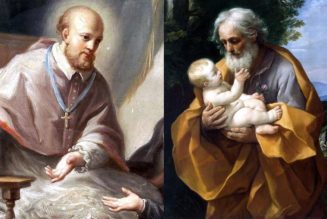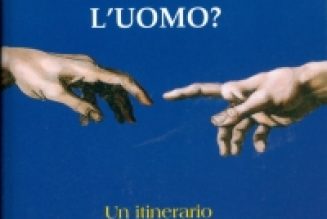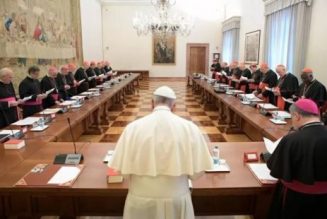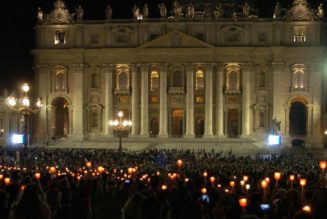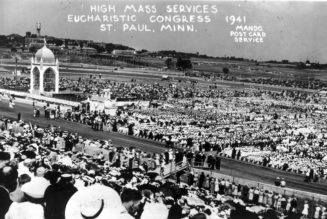
Lay witness has a huge impact, but priests have to be there to provide the sacraments. That’s one important lesson from the readings this Sunday, the Twenty-third Sunday in Ordinary Time, Year B.
The story told by Mark in the Gospel shows exactly how this works.
First, even Jesus’s travel route is important in this Sunday’s Gospel.
The passage begins by saying, “Jesus left the district of Tyre and went by way of Sidon to the Sea of Galilee.” If you look at a map of the territory, you will see that this is like saying, “Jesus left New York, and went to Washington, D.C., by way of Boston.”
This is a telling detail about Jesus’s modus operandi. He often doesn’t take the most efficient way; he takes the most efficacious way. The most efficient way to save the world might have been to appear in the palaces of all the kings on earth at once, and convert them. But in fact, the only way to effectively make the whole world Christian is for Jesus Christ to encounter each person with love and touch each in a deeply personal way.
So, he went from Tyre to Galilee by way of Sidon, stopping at synagogues and villages the whole way, to give as many people as possible an opportunity to have a personal encounter with him, then went “into the District of the Decapolis. And people brought to him a deaf man who had a speech impediment and begged him to lay his hand on him.”
There is a lot in these few words.
First, they recall an earlier reference to the Decapolis in the Gospel of Mark. There was a man from the Decapolis from whom Jesus expelled a “legion” of demons. The man was so moved that he wanted to join Jesus as a disciple. Jesus said No, and told him to go back to his home to tell his family what had happened. In that story, we learned that “the man went off and began to proclaim in the Decapolis what Jesus had done for him; and all were amazed.”
So this Sunday’s Gospel shows us how effective that one man was, after telling his neighbors he was freed by Jesus. Because of him, enough people were convinced about Jesus that they brought their deaf-mute friend to Jesus to be healed.
Mark also includes the interesting detail that these people try to tell Jesus how to do his job.
Those who bring their friend to Jesus “begged him to lay his hands on him.” Which is not exactly what Jesus does.
Like those friends who wanted their buddy to be healed, we may want Jesus to answer our prayers according to our precise instructions. He won’t. He will answer them his way.
And in this case, Jesus’s way is significant. He “took him off by himself away from the crowd.” Peter must have gone with him. Mark was Peter’s secretary, and his Gospel is taken to be a record of Peter’s stories, and we get very specific details of what happened by the side of the road.
The very fact that Jesus took the man aside is important: He wants to encounter him face-to-face rather than as part of a crowd. What was true then is true now: Jesus wants to have a personal encounter with each of us. But he also wants a sacramental encounter with each of us.
Jesus “put his finger into the man’s ears and, spitting, touched his tongue, then he looked up to heaven and groaned.” This is a very sacramental description. Catholics believe that God uses ordinary stuff in his sacraments — water, bread, wine and oil — to deliver his grace. He does this because we are embodied creatures, so we need something we can see, smell and touch.
The “stuff” used in the sacrament is called the “matter” of the sacrament. The matter has to coincide with the precise delivery of the “form” of the sacrament, the formula of spoken words that confect the sacrament. The priest says, “I baptize you …” applies water, and we are incorporated into God’s family. The priest says, “I absolve you …” and we are absolved. The priest says, “This is my body …” and the host becomes the Body and Blood of Christ.
During his public ministry, Jesus could travel from Tyre to Galilee by way of Sidon, and meet people face to face to have an encounter with them. Now, he does that through his envoys, us, and through his presence in the sacraments.
So, the way this works is this: First, lay people hear about Jesus, often from another lay person, and take a few steps toward conversion. Second, they have a personal encounter with Jesus, often being brought to him by their friends. Third, Jesus heals them sacramentally.
The fact that Jesus used his tongue and touch to heal the man’s mouth and ears is significant.
The message to us in this Gospel passage is clear: People all around us are living in a silent, Christless world, and we need to bring them to Jesus — to the tongue and touch of Jesus by his words in Scripture and his presence in the sacraments.
St. James in the Second Reading even says we need to stop playing favorites, and bring anyone and everyone to Jesus. Jesus doesn’t want to save only leaders, and he doesn’t want to save only “church types,” either. Showing no partiality means, among other things, not focusing just on those who are already spiritually inclined. In fact, people who have an atheistic commitment are often even more ready to hear from Jesus than others, as Ross Douthat pointed out in the New York Times.
“The very act of declaring yourself an ‘atheist,’” he said, “suggests a particularly high level of interest in religious detail and debate — higher than many self-described Methodists or cradle Catholics who have a vague belief in God and show up at church on holidays, and also higher than the many nonbelievers who are merely indifferent to religion.”
These are the people who need to hear the words of Jesus from our mouths. And we happen to live in a time where we have greater means to learn and share the truths of the faith than ever before. God always raises up the help he needs for the times we are in. He has done so now, from Bishop Robert Barron to Sister Miriam Heidland— from Gloria Purvis to Father Michael Schmitz. There are whole organizations created to form us, from the Thomistic Institute to the Augustine Institute, from Ascension media to Media & Culture at Benedictine College.
But people also need that personal and sacramental encounter with Jesus.
Ultimately, people need more than the right answers. They need witnesses; actual Christians who are living a sacramental life and are changed and bettered by it.
Opponents often claim that the angry, name-calling incivility of some Christians during the Trump presidency and candidacy turned people off to Christianity. They say Christians are now known for hatred instead of love, and for what they are opposed to rather than what they are for. Polling bears this out: an overwhelming majority of young people see Christians as judgmental and uncharitable — even while Christians don’t see themselves that way at all.
That’s a big problem. As St. John Henry Newman said, “The heart is commonly reached, not through the reason, but through the imagination …. Persons influence us, voices melt us, looks subdue us, deeds inflame us.”
Ultimately, reason is just the necessary intellectual corollary to our real argument, which is the witness of our love, which is Jesus’s love, manifested in our life.
Jesus is the ultimate witness, and the First Reading explains how.
Mark uses his Gospel to show Christ’s Divinity, strongly, throughout, by showing him doing things that only God could do, like forgiving sins, multiplying bread, walking on water — and opening the ears and mouths of a deaf mute.
“Here is your God,” says the Lord in the Book of Isaiah. “He comes with vindication; with divine recompense. He comes to save you. Then will the eyes of the blind be opened, the ears of the deaf be cleared, then will the lame leap like a stag, then the tongue of the mute will sing.”
Jesus is the great Witness to God’s love who fulfills that prophecy. The Lord comes not to condemn the world, but as a magnanimous healer of the infirmities of mankind. He doesn’t look at the world as a lost cause. He says, “Streams will burst forth in the desert, and rivers in the steppe. The burning sands will become pools, and the thirsty ground, springs of water.” He wants to make the barren, Christless, world into a fruitful and abundant place. He wants to make people free and happy, not distrustful and sad.
When it comes to sharing his Good News, he knows that we are too often deaf mutes. This Sunday, he will take each of us aside from the crowd, and one by one, touch our tongues with his very body and blood in the Blessed Sacrament. He will take away what impedes our speech and bless our mouths to share his word.
And after Mass we can say, like the lay leaders in the Gospel, “He has done all things well.” We will be able to proclaim to the world, with Isaiah, “Be strong and do not be afraid,” and with St. James, “God chose those who are poor in the world to be rich in faith and heirs of the kingdom that he promised to those who love him.”
Image: Bernard Spragg, Negative Space

